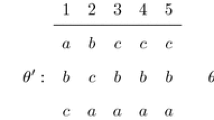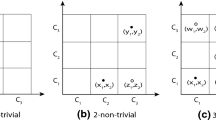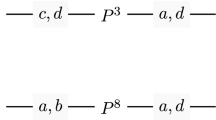Abstract
In this paper, we prove some versions of the Arrovian impossibility theorem in T 1 connected alternatives spaces, with the collective rationality condition weakened from transitivity to acyclicity, the Pareto condition replaced by some weaker conditions, and a continuity condition of social preferences imposed. Moreover these impossibility theorems are applied to a distributive problem of private goods in economic environments.
Similar content being viewed by others
References
Arrow KJ (1963) Social choice and individual values, 2nd edn. Wiley, New York
Binmore KG (1969) Social choice and parties. Rev Econ Stud 43: 459–464
Blair DH, Pollack RA (1982) Acyclic collective choice rules. Econometrica 50: 931–943
Blair DH, Bordes G, Kelly JS, Suzumura K (1976) Impossibility theorems without collective rationality. J Econ Theory 13: 361–379
Blau JH (1957) The existence of social welfare functions. Econometrica 25: 302–313
Border KC (1983) Social welfare functions for economic environments with and without the Pareto principle. J Econ Theory 29: 205–216
Bordes G, Salles M (1978) Sur l'Impossibilié des fonctions de décision collective: un commentaire et un résultat. Rev Econ Polit 88: 442–448
Bordes G, Le Breton M (1989) Arrovian theorems with private alternatives domains and selfish individuals. J Econ Theory 47: 257–281
Campbell DE (1988a) Generalized oligarchies: social choice without Pareto principle or transitive indifference. J Math Econ
Campbell DE (1988b) Continuous preferences and Arrow's independence axiom. University of Toronto, mimeo
Campbell DE (1989a) Wilson's theorem for economic environments and continuous social preferences. Soc Choice Welfare 6: 315–323
Campbell DE (1989b) Arrow's theorem for economic environments and effective social preferences. Soc Choice Welfare 6: 325–329
Campbell DE (1989c) Arrow's independence axiom and economic environments. University of Toronto, mimeo
Campbell DE (1990) Can equity be purchased at the expense of efficiency? An axiomatic enquity. J Econ Theory 51: 32–47
Debreu G (1954) Representation of a preference ordering by a numerical function. In: Thrall RM, Coombs CH, Davis RL (eds) Decision processes. Wiley, New York, pp. 159–165
Donaldson D, Weymark JA (1988) Social choice in economic environments. J Econ Theory 46: 291–308
Eilenberg S (1941) Ordered topological spaces. Am J Math 63: 39–45
Fountain J, Suzumura K (1982) Collective choice rules without the Pareto principle. Int Econ Rev 23: 299–308
Gibbard A (1969) Social choice and the Arrow conditions. Unpublished manuscript
Kalai E, Muller E, Satterthwaite M (1979) Social welfare functions when preferences are convex, strictly monotonic, and continuous. Publ Choice 34: 87–97
Kelsey D (1984) Acyclic choice without the Pareto principle. Rev Econ Stud 51: 693–699
Mas-Colell A, Sonnenschein H (1972) General possibility theorems for group decisions. Rev Econ Stud 39: 185–192
Schmitz N (1977) A further note on Arrow's impossibility theorem. J Math Econ 4: 189–196
Sen AK (1970) Collective choice and social welfare. Holden-Day, San Francisco
Suzumura K (1983) Rational choice, collective decisions and social welfare. Cambridge University Press, London
Wilson RB (1972) Social choice theory without the Pareto principles. J Econ Theory 5: 478–486
Author information
Authors and Affiliations
Additional information
This is a revised version of my Working Paper No. 111. I would like to thank two anonymous referees of the journal for their insightful comments. This paper was reported at the Western Meeting of Japan Association of Economics and Econometrics, held at Tezukayama University June 1990, and at Second Annual Southeastern Economic Theory Meetings, held at Florida University October 1990. I am grateful to Professors Tetsuya Kishimoto, Makoto Okamura, Koichi Suga, and Donald Campbell for their insightful comments. This paper is supported in part by the Tokyo Center for Economic Research.
Rights and permissions
About this article
Cite this article
Nagahisa, Ri. Acyclic and continuous social choice in T 1 connected spaces. Soc Choice Welfare 8, 319–332 (1991). https://doi.org/10.1007/BF00183043
Received:
Accepted:
Issue Date:
DOI: https://doi.org/10.1007/BF00183043




